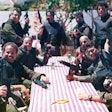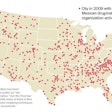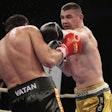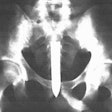"Regard your soldiers as your children, and they will follow you into the deepest valleys. Look on them as your own beloved sons, and they will stand by you even unto death!" —Sun Tzu - the Art of War
Today's law enforcement officers face many different threats to their health and well being. Working in the Los Angeles County Sheriff's Department's Major Crimes Bureau Prison Gang Unit as a team supervisor made me very aware of the awesome responsibility I bore. Not only was I responsible to my own supervisors, the sheriff, and to the good citizens of the county I served, but I was also directly responsible for the careers and lives of the people I supervised.
I was a fire team leader in combat during the Tet Offensive of 1968 in Nha Trang, Vietnam. I have led men into harm's way. I have seen men killed in combat. I have grieved and relived my decisions and wished to have another opportunity to make a better decision that might have saved someone from bloodshed. But that cannot be. Therefore I must live forever with the actions or lack of action I took, and the consequences I wrought.
I served great military NCOs and officers who thought and led like this in Vietnam. This must have been where that principle was forged in me. I trusted these men to lead me only into situations carefully calculated to inflict the most injury to the enemy and the least injury to the men under their command. This is not a perfect situation—men will be lost in armed conflict—but these leaders instilled this trust by their consistent word and action. They confirmed it by physically leading by example and never sending us anywhere they were not willing to go themselves.
When I first joined the LASD I saw many of these same fine traits in most of the sergeants and lieutenants I worked for. My measure of the leadership ability of these supervisors was; "would I follow this person into combat?" And the truth is that most of the time I could answer yes.
But today in most of the gang units that I have seen operating in and around Los Angeles I would have to answer "No!"
Don't get me wrong, I think the average gang cop is doing the best he can do, or as we used to say in Vietnam, "We done so much, for so long, with so little, that they now expect us to everything with nothing at all."
This criticism is directed at the law enforcement leadership and its complete inability to effectively engage the criminal gangs and drug cartels operating with seeming immunity in our communities. If they were generals in the Iraq or Afghanistan theaters they would have been sent home in shame long ago. I used to joke that I was going to write a book called "Police Impostors," a book about law enforcement leaders who claim to be cops but are really only politicians.
These "leaders" are searching for a politically correct and universally acceptable anti-gang program to implement. This is foolish, and exposes a lack of moral courage. There is no effective program that will be universally acceptable or politically correct.
Los Angeles has had 158 years to develop its law enforcement gang experts and anti-gang programs. They have evolved and engaged LA gangs with various degrees of success for more than the last 150 years. We do not need "experts" from New York, Philadelphia, Chicago, or El Salvador to show us how to do it. These experts should continue to ply their programs in the cities they come from. LAPD, LASD, Long Beach, Pasadena, and every other major police department, and many smaller ones, have highly qualified gang experts capable of instituting programs that would work in Los Angeles.
I charge that this means that police officers have been held back, their positive actions restricted, and their physical safety compromised. When there is a local police intelligence vacuum on criminal gangs and the Chief is taking pictures for the news with local gang leaders, who is to blame? When line officers must pay for their own gang schools and tactical training seminars, whose fault is it? When officers are killed by recidivist gang members, or when officers use tactics and weapons approved for their political impact instead of their effectiveness, who bears the guilt?
What we do not have is a city and county government that will place a priority in the budgeting of these police anti-gang programs and the moral courage to do what is right, as opposed to what is politically expedient. We lack law enforcement leaders willing to take the political heat. They lack the moral courage to stand under fire for the safety and security of the people they swore to protect.
The "risk management" lawyers and ACLU advisors will not make any meaningful contribution to solving the gang problems. If you want to be "the leader that made a difference in the gang problem," you must look to your own law enforcement department's gang experts and listen carefully to what they say. You must trust and protect them like you would "your own beloved sons." Then you must reach down into your soul and pull out whatever courage you have left to endure the withering fire. Then you will show true leadership in the face of adversity, and maybe 100 years from now people will remember your name.













